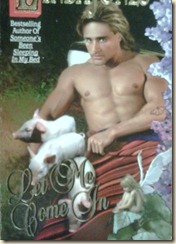If not the worst romance novel cover, ever, then at least in the top 20:

Ramblings from the Shepherdess of Stephenville's beloved bookstore, The Literary Lion
But--the paradigm-shifting part--was the book box used. Amazon, eat your heart out. This puppy uses some sort of tessaract/fractal valmorphanizing technology to SNICK! flap instantly into a shape perfectly adjusted to fit nearly any size of book, and then SNICK! flip back into a flat single sheet, all from merely receiving one's thoughts of boxness or flatness toward the cardboard miracle (well, nearly). I'm enchanted and have wasted several minutes trying to fit my feet into the thing in hopes that it will heal my limp, too. No dice yet in that department, but I remain optimistic and will soon be trying it on my head as well. Oh, and don't worry--I, too, have watched Tron, Dear Reader--I tested it with an orange, first, and am pleased to report no inside-out peely masses of gory fruit goo here.
(re-posted from the myspace blog)
Death on Demand was...oh...say a 2 out of four (lion) paws. Mmeh. I love bibliomysteries, so it was already in the plus column there, but it was too easy to figure out, and some of the book shop nittygritty didn't strike me as realistic. I'll be reading the rest of the series, though, so it was fair enough to make that cut.
Finished The Road. Hm. I have mixed feelings on this one. Pretty sure I would have enjoyed it more if I were a man. Frustrated with some of the choices made by the protagonist, but I suppose they were in keeping with his character. Not the best post-apocalyptic book I've read, but a very quick read and some great imagery. 2.5 paws up.